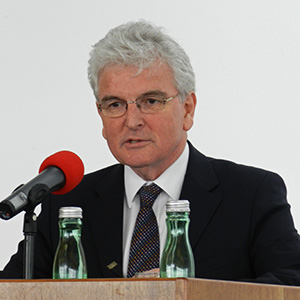

On 25 March 2013, Lord Des Browne of Ladyton, former UK Defence Secretary and Board member of the European Leadership Network (ELN), delivered a keynote presentation during the intensive nuclear non-proliferation and disarmament course for diplomats conducted by the VCDNP and the Center for Nonproliferation Studies.
Lord Browne began with an overview of the state of affairs in nuclear disarmament. Although nuclear arsenals have been significantly reduced since the Cold War, there is little reason for optimism. He noted the continuing crisis over the Iranian nuclear program and pointed out that the last thing the Middle East needs is another nuclear state, warning that the situation could devolve similarly to the Cuban missile crisis of 1962. North Korea continues to improve its nuclear and missile capabilities, and two-thirds of the population of South Korea now favors acquisition of nuclear weapons. India and Pakistan are both increasing their nuclear arsenals and China is investing in an improved nuclear triad. Distrust in the US-Russian relationship is at the lowest point since the Cold War, and both countries continue to modernize their nuclear-capable delivery systems and platforms. And while the beginning of discussions within the P-5 framework is a positive development, some may not perceive talking as real progress.
Europe's role is central to the global "nuclear scene"—it is home to seven out of 14 countries that have nuclear weapons in their territories. Europe remains politically divided between Russia and NATO. Countries in the Baltic region and the east of Europe remain mistrustful of Russia while Russia is concerned about NATO missile defense plans and plans to further enlarge NATO to the east. It remains to be seen whether the recently announced cancelation of Phase IV of the missile defense program can improve the atmosphere.

While the responsibility for the next step in nuclear arms reductions rests with the United States and Russia, which together possess 95 percent of global nuclear stockpiles, Europe can play a role in the diplomatic efforts required for that step. European NATO states can either empower the dialogue between the United States and Russia or constrain it. Thus, the quality of their political and security relationship directly impacts the prospects of further nuclear arms reductions. Europe should take responsibility for progress beyond broad supportive statements.
In this regard, Lord Browne emphasized the role political leaders should play in these efforts. Solutions to the continuing mistrust, tensions, and conflict can only be political; politicians can generate public support for new policies and agreements. The two key impediments are lack of expertise necessary to challenge traditional views and the packed domestic and international agendas, on which nuclear policy lacks urgency compared to economic and financial problems.
Regarding the practical agenda for the future, Lord Browne offered a range of proposals aimed in particular at the possible role of Europe.
European leaders, he said should move beyond concentration on individual issues toward facilitating integration of Russia into a broader European security framework. In this regard, he noted the European-Russian Leadership Task Force, a joint project of ELN, the Polish Institute for International Affairs, and the Russian International Affairs Council that will be launched later this year.
He also called for reasserting the primacy of politics. In this connection, Lord Browne pointed at the special responsibility of senior leadership figures with experience in government and politics for moving the disarmament process forward. He particularly stressed the need to achieve the following goals: build political credibility behind the notion of nuclear disarmament; develop relevant capacity among young political leaders; lobby serving ministers and parliamentarians for change to promote cross-party and cross-border political strategy; and engage and mobilize civil society.

In response to questions following the presentation, Lord Browne reminded the audience that obligations under the Article VI of the Treaty on the Non-Proliferation of Nuclear Weapons (NPT) are not limited to nuclear states alone. They apply to all parties to the NPT, including those that do not have nuclear weapons. These states need to actively engage and contribute, although the primary responsibility continues to rest with the nuclear weapon states.
One important issue on the disarmament agenda is tactical nuclear weapons. He argued that it is generally accepted that they serve no military purpose and thus could be removed from Europe. Dialogue within NATO on these weapons is virtually absent, however; for example, he said, the majority of Italians do not even know that their country still hosts nuclear weapons. The issue has become hostage to demands of reciprocity and to the search for consensus in NATO. Politicians should be guided by the process rather than by personal or national ambitions.
By continuing to use the site, you agree to the use of cookies. more information
The cookie settings on this website are set to "allow cookies" to give you the best browsing experience possible. If you continue to use this website without changing your cookie settings or you click "Accept" below then you are consenting to this.